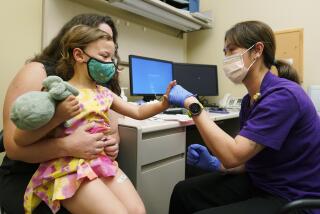Pediatric Leaders Say Future Holds Much Promise
NEWPORT BEACH — Can you imagine a world where mumps, diphtheria and German measles have been eradicated?
A world in which a new drug, administered by paramedics to a child who has nearly drowned, will prevent irreversible brain damage?
A world in which children, rich and poor, get comprehensive medical care?
This was the hopeful vision for health care in the year 2001 that pediatric leaders from Orange County and the nation painted Friday at a medical conference sponsored by Children’s Hospital of Orange County.
To celebrate the recent opening of CHOC’s new, state-of-the-art hospital, more than 225 doctors, nurses and other health-care workers gathered at Le Meridien Hotel to discuss current medical research, suggest future treatments and talk about access to medical care for children.
Among the topics:
* Dr. David Lang, CHOC’s director of infectious diseases, predicted that early in the 21st Century, new drugs will eradicate mumps, diphtheria, rubella (German measles) and yellow fever. But, he warned, AIDS and HIV infections will continue to spin out of control, with many more women and children becoming ill.
* Neurologist Ira Lott, who is also chairman of pediatrics at the UC Irvine School of Medicine, suggested that in the next century, a compound, now used in animal experiments, may be available to paramedics to prevent irreversible damage when the brain is deprived of oxygen--when a child is injured in a car accident, for instance, or falls into a swimming pool.
Lott also predicted that by the year 2001, doctors will increasingly resort to surgery on young children with seizures--working to identify and excise the damaged area of the brain and to “cure epilepsy.” Already, in the past five to eight years, such surgeries have been done successfully, Lott said, though they are most effective on children under age 8 whose brains are best able to grow and recover from an injury.
The conference, which ends today, included speeches by leaders from both medicine and politics. Dr. Norman Shumway, the Stanford surgeon credited with pioneering work in open-heart surgery, traveled from Palo Alto to describe heart transplant techniques on children and to show pictures of some of his smiling, young survivors.
Gayle Wilson, wife of Gov. Pete Wilson, reported that each year 11% to 15% of California’s newborns are exposed to drugs in the womb--everything from heroin and crack cocaine to alcohol.
When substance-abusing mothers seek treatment during pregnancy, often they are told: “Oh, you have a medical problem. Come back when you are not pregnant,” said Gayle Wilson, who has worked to reduce drug addiction among pregnant women.
Though male drug abusers can choose from an array of drug treatment programs, there are few programs for women, she said. The governor’s 1992-93 proposed budget asks for $35 million to expand services to drug-abusing women and their babies. Also, she said, the Wilson Administration this year plans the state’s largest drug prevalence test ever--anonymous urine sampling of mothers-to-be at 200 hospitals in California.
A star of the conference was Friday night’s dinner speaker--pediatric surgeon C. Everett Koop, the feisty former U.S. surgeon general during the Reagan Administration.
At a news conference Friday afternoon, Koop met with reporters to berate the nation’s policy-makers for their attitudes toward children.
“Children in this country are treated as though they were garbage,” Koop said. “I don’t understand how we go to bed at night and sleep. They do not get a fair shake.”
In this high-tech nation, children are still becoming blind and deaf from measles because officials haven’t spent the money to immunize them, he complained.
And the problems that made Koop “bang my head against the wall” as surgeon general are continuing, he said, mentioning alcohol abuse, drug abuse, communicable disease and low birth-weight babies. Though “in pockets” across the nation, the situation is improving, “in poverty-stricken rural America or poverty-stricken urban America, it’s not improving. It’s probably getting worse,” Koop said.





